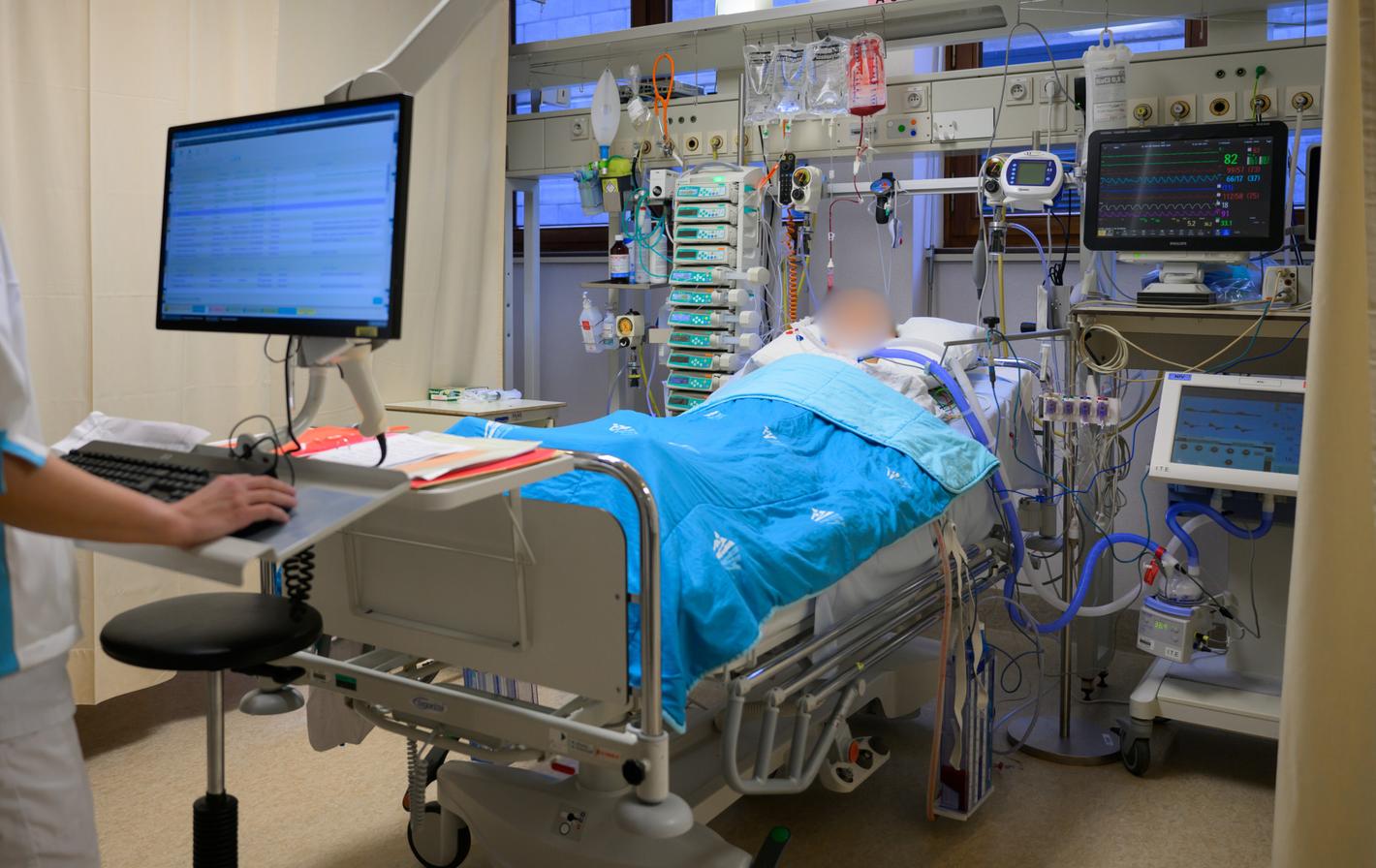Informed consent
-
This page provides more information about your stay and informed consent for necessary procedures. It is important for you to be aware of this.
-
Sometimes the urgency of the situation will not allow major interventions (for instance, an urgent intervention) to be discussed with you in advance. The doctor will then act in good conscience in the patient's best interest. Naturally, all necessary information will be provided afterwards.
-
We assume that the information here will suffice to adequately inform you.
Do you still have questions? Please be sure to ask them to one of the healthcare providers.
Welcome to our ICU
You or your loved one have been admitted to the intensive care unit, where patients stay after major surgery or after a serious complication from surgery, an accident or another condition.
Within this department, there are several hospitalisation units. Depending on the type of surgery or condition, the doctors decide which intensive care unit you will be best treated in:
- Intensieve zorg 5
- Intensieve zorg 6 (the current ICU)
- Intensieve zorg 7 (paediatric intensive care)
- Intensieve zorg 8 (burn centre)
- Intensieve zorg 9
We also collaborate with other intensive care units linked to the internal medicine department (Intensieve zorg 1, Intensieve zorg 2) or the cardiovascular diseases department (Intensieve zorg 4).
To make your stay as smooth and pleasant as possible, you will find the most important information on this page. We hope this info will serve you as a useful guide during your admission to our intensive care unit.
Still have questions?
-
If so, you can always contact the nurse caring for you or your loved one.
Your stay in an intensive care unit
On an intensive care unit, the patient's state of health is constantly closely monitored. The team of caregivers does all they can to treat the patient to the best of their ability. Sometimes specialised tests are necessary.
Click below to read more about what is involved in intensive care.
To continuously monitor the patient, we use a monitoring device or screen. Using these, we monitor various important bodily functions, such as heart rhythm and blood pressure. To track these, a catheter (tube) is inserted into a vein.
Various devices may be used during intensive care treatment. For example, many patients need temporary respiratory support. A respirator connected to a breathing tube, which passes through the mouth into the trachea, is used for this purpose. During this treatment, the patient cannot speak. During this phase of treatment, some patients are also kept in a deep sleep. In addition, we sometimes use devices that (temporarily) take over the functioning of the heart or kidneys.
Powerful drugs of course play an important role in intensive care treatment. This medication is administered through a catheter (tube) in a large vein. Usually, this catheter is placed in the neck or just below the collarbone. For the patient's comfort, painkillers or sedative (anti-anxiety) drugs are often administered.
Several examinations happen during treatment:
- daily examination by the doctor
- daily blood and urine tests
- if necessary, examinations using equipment: radiological examinations (RX or CT scan), visual examinations (bronchoscopy, gastroscopy, coloscopy) ...
All these examinations are necessary for optimal treatment, even though they may pose a risk. This depends on the patient's general health condition.
Information through the healthcare providers
The care team keeps the patient and the relatives as informed as possible about the evaluation of the patient's health condition.
If possible, the patient is informed in advance of planned and/or additional examinations and operations. It may happen that healthcare providers need to intervene urgently, and that the situation thus doesn't enable them to discuss this with the patient in advance. In that case, the doctor will act in good faith in the interest of the patient or their representative. Afterwards, the necessary information will of course be provided.
Freedom of movement
It is important to know that the patient's freedom of movement is slightly restricted, usually when they are ventilated via a ventilator. We do this to ensure the patient's safety. For the same reason, a patient may need to be restrained if they were to become distraught due to being seriously ill or due to a problem in the brain.
Your room
On this ICU, men and women can be cared for in the same room. There is also no distinction between single and double rooms. The single rooms are used primarily for patients who must be cared for in isolation.
Picture a room on our ICU (read on below the photo)

Address
Location and accessibility
Parking
-
The designated car park for this department is parking Oost.
Visits on an intensive care unit
Visiting hours
-
Visits are possible every day at set times:
- from 14:00 to 14:30
- from 19:00 to 19:30
-
In principle, family visits are limited to two visits per day.
Please come with a maximum of two visitors per patient at a time. -
Children under 12 years of age are not allowed to visit.
- In exceptional cases, children's visits are desirable and will be allowed. This can be done after consultation with the head nurse.
-
Any exceptions to the standard visiting times can be requested and discussed with the ICU's head nurse and/or supervisor.
-
Please register for each visit at the reception desk at the beginning of the corridor of the intensive care service.
First visit
The first visit to a patient in an intensive care unit can feel rather overwhelming, because of the equipment around the bed and the various tubes, dressings and stickers on the body. If the patient is being ventilated through a tube in the throat, this will prevent them from talking. Ask the nurse how you can make contact with the patient, for example by talking to them or touching them.
Information by telephone
Despite the limited visiting opportunities, as a contact person you can call day or night for information on the patient's state of health on the ward's general telephone number. Once they are on the mend, you can call the patient yourself. At busy times, we may ask you to call back at another time (e.g. around dinner time, when the healthcare provider caring for the patient is quite busy).
Waiting room
We kindly ask you to be present in the waiting room at the start of the visiting hour. Before each visit, please register at the reception desk at the beginning of the corridor of the intensive care unit. A reception staff member will escort you to the ward.
You may have to wait a while, for example because the patient has to undergo an examination that could not be scheduled at any other time or because the patient needs urgent care. Rarely, it may also happen that the patient's condition suddenly deteriorates.
Talking to the doctor
If you want to speak to a doctor, ask the nurse caring for the patient. Due to the intensive nature of the unit, the doctor may not be available immediately.
Contact
-
Head nurse: Tom Van Loon
-
Nurses: +32 16 34 40 70 (available 24 hours a day)
After your admission
As soon as the patient's state of health permits, the patient may be transferred from the intensive care unit back to a regular hospitalisation ward.
During the course of the morning, it is usually clear whether the transfer is possible and whether there is a room on an ordinary ward. If you as a relative call to enquire about this around noon, we can give you further information. This will allow you to prepare for any visit later in the day.
In very exceptional cases, patients can go straight home after their stay in an intensive care unit.
Going home: more information
Have you been given permission to go home? Then you will find more information on this page about help and support at home and the necessary paperwork, among other things.
Team
Staff members
In the Intensieve zorg 6 ICU, you can usually call on:
Prof Meyfroidt, Prof Debaveye, Prof Gunst, Prof De Vlieger and Dr Huynen.
Extra support - The social worker
Are you worried about your illness, family, work or financial situation? Both you and your family members are welcome to have a confidential conversation with the social worker.
The social worker will work together with you to find solutions, give advice on social services to which you are entitled and will help you with questions about insurance and certificates. If needed, the social worker will refer you to external services.
Ask the nurse or call in person on +32 16 34 86 20.
In need of conversation or a listening ear? Ask for the pastor.
Illness and hospitalisation are often thought-provoking. Do you need a quiet, confidential conversation?
There is a pastor working in the ward who - regardless of your philosophy of life - can lend a listening ear if you are having a difficult time or have life questions.
Ask for a pastor via the nurse.
Your thoughts and suggestions
-
Your concerns, experiences and suggestions are important information to improve our patient care. Both positive experiences and things you are unhappy about are certainly worth sharing with us.
-
You can share your thoughts with us via e-mail (intensieve_geneeskunde@uzleuven.be) or by postal mail to:
- UZ Leuven campus Gasthuisberg
Secretariaat dienst intensieve geneeskunde
Herestraat 49
3000 Leuven
- UZ Leuven campus Gasthuisberg
















